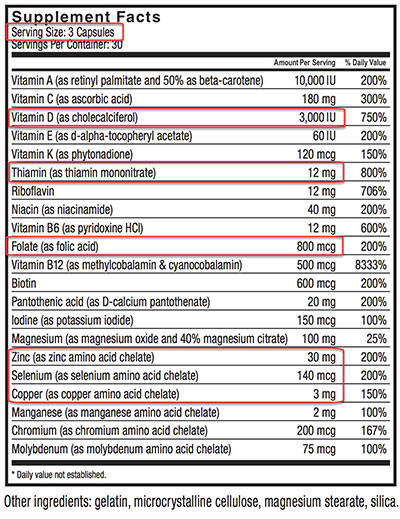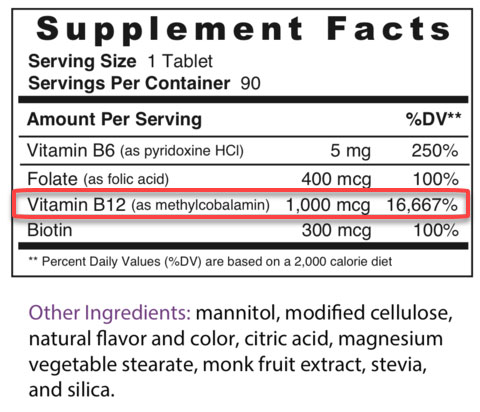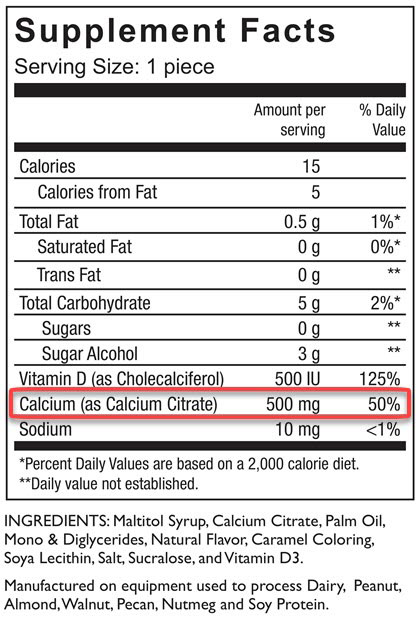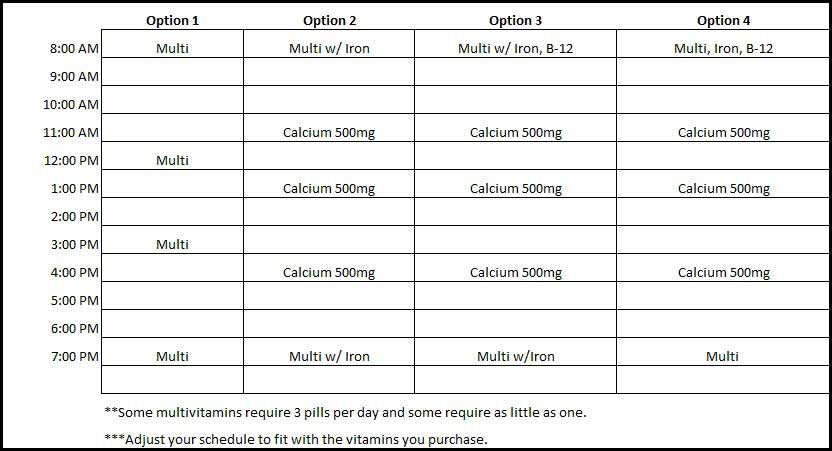How Much Vitamin D Should A Bariatric Patient Take
How Much Vitamin D Should A Bariatric Patient Take
After bariatric surgery, you must take vitamins for the rest of your life. Serious illness can result from non-compliance with your vitamin and mineral guidelines. Mood, energy, and focus can also suffer from a lack of proper vitamins after bariatric surgery. Blood tests are required every three months for your first year after surgery and annually after that.
In this article:
- Why vitamins and minerals are essential after bariatric surgery.
- What types of vitamins and minerals are required by procedure?
- What to look for when buying vitamins and minerals.
- Signs and symptoms of vitamin and mineral deficiencies.
- How much you can expect to spend monthly.
Why Vitamin and Minerals Are Important
Bariatric surgery is all about improving your health, and a big part of improving your health is proper nutrition. Proper nutrition isn't complicated. There are three things you need to think about; water, macronutrients, and micronutrients.
You're probably already tracking your water intake and macronutrients; carbs, fats, and proteins. We recommend using an app like Baritastic to track. After surgery, you and your medical team will be monitoring your micronutrients, too.
Micronutrients are a 'five-dollar' word for vitamins and minerals. They're called micronutrients, because, compared to carbohydrates, fats, and proteins, which you need in large quantities, the amount you need each day is exponentially less.
But they're no less important, and that can present a challenge for those of us living the bariatric life. The fact is, it's hard enough to get everything you need with a normal digestive system. After surgery, it's even more difficult .
If you've had gastric sleeve surgery, you don't have the capacity in your surgically altered stomach to consume enough food to get adequate amounts of key micronutrients. Digestive enzymes may be reduced, limiting the breakdown of food as it passes into your digestive tract.
If you've had gastric bypass surgery, you've got capacity issues, along with malabsorption. B ecause of the surgical changes to your digestive tract, your body can't extract all the nutrients it needs from your meals. It's even more important if you've had duodenal switch surgery.
Most bariatric practices require patients to take supplements once, or maybe even twice a day and follow up with blood work to catch any deficiencies.
There are more than two dozen micronutrients that your body needs to stay healthy. For most of these, you need only a trace amount. Others, such as B vitamins and minerals like iron and calcium, require more than that and, consequently, are more likely to come up short, particularly among bariatric patients.
Here are a few to look out for , no matter what stage of the bariatric journey you're at.
Thiamin , aka vitamin B1 , helps convert food into energy and contributes to healthy skin, hair, and liver. Early symptoms of a thiamin deficiency include fatigue, irritability, uneven sleep, and abdominal discomfort, all of which are common enough as it is among bariatric patients, so they're easy to write off as nothing serious. Ignored long enough, though, things can get much worse.
Vitamin B12 helps the body manufacture new red blood cells and contributes to a healthy central nervous system, too. A small B12 deficiency can have no symptoms at all; untreated, though, it can lead to a general feeling of weakness, lightheadedness, muscle tingling and more.
Iron deficiency is an astonishingly common condition in the United States, even more so among bariatric patients. Early signs of an iron deficiency present as dizziness, fatigue, or light-headedness, a fast heart rate or heart palpitations, or brittle nails.
Calcium and vitamin D go hand in hand because we get them both from dairy products. The sun is also a major source of vitamin D. If you've spent years covering yourself up because of a cold climate or body insecurities, shedding those clothes to get some sun isn't something that always comes easily, and Greek yogurt isn't going to do the job all by itself, either. A calcium deficiency can show up as confusion or memory loss, muscle spasms, numbness, tingling and more. Early signs of a vitamin D deficiency include bone pain and muscle weakness, also easily ignored by bariatric patients who are already dealing with similar conditions post-op.
The good news is, all of this stuff can be easily avoided with supplements. It's really not a question of if you'll take supplements, it's which supplements you'll take and how often. It just goes with the bariatric territory, and each of us must find our own path through it in our own way. The most common supplements post-op are multivitamins, vitamin D, calcium, iron and vitamin B12.
What Types of Vitamins Do I Need?
Before driving to the local Walgreens or CVS to stock up on vitamins you'll need to know what type of vitamins you need. Not all vitamins are created equal.
Let's start with some guidelines of what not to take:
- No gummy vitamins.
- Avoid children's vitamins which are incomplete.
- Consider additional supplementation if you take an 'all-in-one' multivitamin with calcium and iron.
Choosing a Multivitamin
- Depending on the brand and size of the vitamin you'll need to take between 1 and 4 pills, or chewable tablets daily. Read the label to find out how many are required daily.
- It should contain at least 18mg of iron. If you choose a multivitamin without iron, you'll need to take iron supplementation separately.
- Your surgeon or dietitian should provide guidance on how much iron you'll need after surgery.
- It should contain at least 400 mcg of folic acid.
- At least 200% of the recommended daily intake for most, if not all, of the vitamins and minerals listed on the label.
- It contains at least 2mg of copper.
- Should contain 12 mg of thiamin.
- At least 3,000 IU of Vitamin D.
Let's take a look at the label below.

This is the label for Celebrate's Bariatric Multivitamin in capsule form without iron. Almost all of the ingredients have over 200% of the daily recommended value. Vitamin D, Thiamin, Folate, Zinc, Selenium, and Copper all meet the requirements mentioned above. This is a high potency vitamin and 3 capsules are required daily. This is an excellent choice for a gastric bypass or gastric sleeve patient. If taking this vitamin, you'll need to supplement with iron separately (again, speak to your dietitian or bariatric surgeon about your iron requirements). Celebrate has other options that contain iron as well.
Choosing Vitamin B12
- At least 500 mcg per day of Vitamin B12 (cobalamin or methylcobalamin).
- B-12 that dissolves (melts in your mouth) or chewable tablets are the most common choice for vitamin B-12 supplementation.

Some bariatric-specific multi-vitamins will contain enough B-12 where additional supplementation is not required. However, it's very important to read the label. Some bariatric specific vitamins do not provide enough B12. The celebrate multivitamin shown in the first label does have 500 mcg of vitamin B12. If you're taking the Celebrate multivitamin additional supplementation is not required unless your blood levels are low.
Calcium
- 1500 mg per day is required.
- For best absorption 500 mg doses should be taken at breakfast, lunch, and dinner. (3 times per day)
- It should not be taken within 2 hours of iron. Calcium inhibits iron absorption so separating these is necessary.
- Calcium Citrate is recommended. Absorption is better compared to calcium carbonate.

Iron
- If you're taking a multivitamin without iron, you'll need to take an additional iron supplement daily.
- Follow the guidelines recommended by your surgeon.
- Men and post-menopausal women may not require additional iron supplementation.
- Do not take iron and calcium at the same time. Separate iron and calcium by at least 2 hours.
- 18 mg per day
- 45 to 60 mg per day for women with menses or patients with a history of iron deficiency.
- Vitamin C may help with the absorption of Iron.
Vitamin Requirements by Procedure
Gastric Bypass and Gastric Sleeve Vitamin Requirements
We've put together a number of combinations that will meet your requirements for post-op gastric bypass and gastric sleeve patients. Choose an option that best fits your lifestyle.
Option 1 (Easiest)
- All-in-one multivitamin that contains both calcium and iron* (must be bariatric specific)
- You'll likely need to chew 4 tablets of this type of vitamin daily.
*Calcium inhibits the absorption of iron, so even these all-in-one multivitamins have everything in on tablet you may not be getting as much iron as you need.
Option 2 (Easy)
- Multivitamin with 18mg of iron and 500 mcg of B-12* (a quality bariatric multivitamin is recommended)
- Calcium Citrate 1500 mg per day.
*If your surgeon recommends more than 18mg of iron per day, you can find a bariatric multivitamin with 36mg of iron or add an additional iron supplement.
Option 3 (Additional Vitamin B-12)
- Multivitamin with 18mg of iron* (a quality bariatric multivitamin is recommended)
- Calcium Citrate 1500 mg per day.
- Vitamin B-12 500mg per day.
*If your surgeon recommends more than 18mg of iron per day, you can find a bariatric multivitamin with 36mg of iron or add an additional iron supplement.
Option 4 (Additional Iron and Vitamin B-12)
- Multivitamin
- Calcium Citrate 1500 mg per day.
- Vitamin B-12 500mg per day.
- Iron 18 mg per day.*
*If your surgeon recommends more than 18mg of iron per day, you can find a bariatric multivitamin with 36mg of iron or add an additional iron supplement.
This is what a typical schedule looks like for each option above.

What to Look For When Buying Vitamins and Minerals
When choosing a vitamin and mineral supplement after bariatric surgery, you'll want to consider the following:
Does this vitamin meet my needs?
There are a lot of different formulations and options when it comes to choosing a vitamin and mineral supplement. Understanding how to read the nutrition label is important along with knowing which minerals and vitamins and what quantities are needed. Re-read the section above if you are having trouble identifying if a vitamin or mineral will meet your needs.
How many do I need to take?
Taking 3 pills spaced throughout the day and then taking 3 more calcium chews is a lot. Remembering to take these consistently can be difficult. Fortunately, there are a number of options to fit your personality. If you are consistent and detail oriented, you will probably do well with a multivitamin that requires 3 or more pills throughout the day.
If remembering to take pills is difficult, you may want to choose a one-pill-per day option. One pill per day options are typically bigger in size and they may combine vitamins that do not absorb well together.
Can I swallow pills or do I need a chewable, a patch, or a drinkable vitamin?
Swallowing pills shortly after surgery can be difficult. Many bariatric programs recommend starting with a chewable vitamin and mineral and then switching to a capsule. For patients that prefer to never swallow pills, a quality chewable multivitamin is fine to take daily.
Is this a brand that I trust?
Unlike medicines and food, the FDA (Food and Drug Administration) does not have to approve or even inspect vitamins and minerals sold in the United States. Look for brands that are labeled with NSF International, US Pharmacopeia, Underwriters Laboratory, or Consumer Lab seal. These are 3rd party agencies that test to confirm that the supplements actually contain what is on the label. Be wary of vitamins and supplements that come from outside of the US. These may contain toxic substances or more filler than actual vitamins. Some of the more reputable bariatric specific brands include Barimelts, Celebrate Vitamins and Bariatric Fusion.
Can I afford to take these for the rest of my life?
Price is important. While you should choose the best vitamin that you can afford, many patients are on fixed income and need to be price aware. The good news is that there are a number of options that do not need to break the bank. Below are a couple of multivitamin options that are very reasonably priced for under $25 per month.
- Procare's All-In-One Bariatric Multivitamin – $17.99
- Bariatric Fusion's Complete Chewable Vitamin and Mineral Supplement – $24.99
With the Procare All-In-One Bariatric Multivitamin you'll need to supplement with additional calcium which typically costs about $34 per month. The Bariatric Fusion option does not require additional supplementation.
Calcium is more expensive but very important. A typical multivitamin and calcium monthly regimen will usually cost between $50 and $70 per month. It's not cheap but money well spent to ensure you stay healthy, happy, and active.
Conclusion
Thankfully, bariatric patients today have an entire range of products and solutions to choose from, which can be broken down into three categories: pills, chewables, drinkables, patches.
You should plan on spending at least $25 per month and most bariatric patients pay around $50 to $70 per month for high quality bariatric vitamins and minerals. You've undergone a major procedure to get healthy, it's important to invest in yourself to stay healthy.
We recommend choosing a bariatric specific vitamin that follows the ASMBS guidelines to ensure your micronutrient needs are met.
Figuring out your schedule, sticking to it, and finding a vitamin that works for you is key to success.
Post-op, micronutrients have to be part of your daily routine for the rest of your life. Work closely with your surgeon and your dietitian to figure out exactly what you need and how to get it.
How Much Vitamin D Should A Bariatric Patient Take
Source: https://www.obesitycoverage.com/bariatric-vitamins-guidelines/


Tidak ada komentar:
Tulis komentar